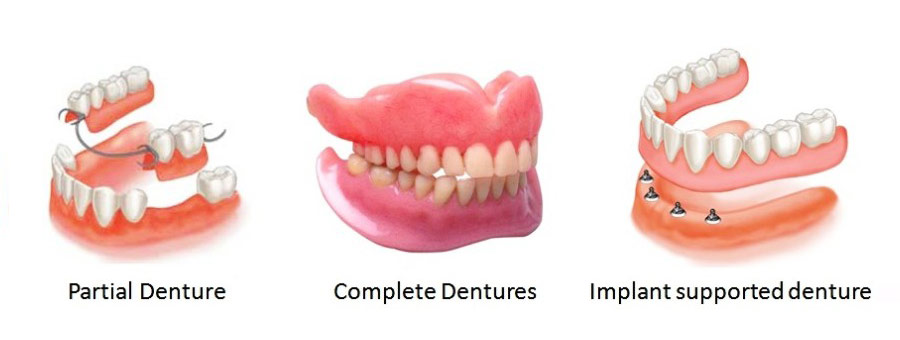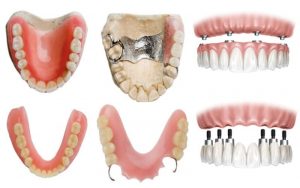
There’s no doubt that gaps left by missing teeth can make you feel uncomfortable and self-conscious. Even normal everyday tasks such as smiling, laughing and eating can become unpleasant. Not only can missing teeth have an impact on your confidence, it can also cause physical issues with teeth moving, due to the gap and space created by missing teeth forming an unwanted angle. Dentures may be just what you need to boost your confidence!
Dentures are removable replacements for missing teeth made of acrylic, nylon or metal. Whilst they may take some time to get used to, there are many benefits to getting dentures. In this article, we’ll provide an overview of how dentures are designed, the types of dentures available, emergency denture repair and denture care.
How are Dentures Designed?
There are two main types of dentures full or complete denture and partial denture. Another type of denture available is a fixed denture.

Depending on your condition your Prosthetist may recommend a complete, partial or fixed denture. A full or complete denture is generally recommended when all your teeth are missing, and a partial denture may be recommended when some of your natural teeth are remaining.
1. Full or complete denture: can be either a conventional or an immediate complete denture. A conventional denture is used when the gum tissues have completely healed, while immediate dentures are used immediately after the teeth are removed, without allowing the gums to heal fully. Conventional dentures are made roughly 12 weeks after the teeth have been removed allowing the gums time to heal. Another advantage a conventional denture has over an immediate denture is they do not require any adjustment after they have been used.
A conventional denture requires a bit of adjustment if not at all. An immediate denture requires a lot more adjustment because the gums will shrink over time.
Unlike conventional dentures, immediate dentures are considered temporary. This is due to the healing process of the bones and gums, shrinking over time causing a need for readjustment, whereas complete dentures can be used for a period of up to five to ten years.
2. Partial Dentures: are used when some of the natural teeth remain either in the upper or lower jaw. Partial dentures typically have two options; removable partial dentures and fixed bridge dentures. Removable partial dentures are replacement teeth attached to a gum-coloured plastic base, which may be connected by a metal skeleton that keeps the denture in position. For a fixed bridge denture, one or more of the teeth are replaced by placing crows on either side of the space and attaching artificial teeth to them. The fixed bridge is then cemented or glued into place. One big advantage of a partial denture is that it replaces missing teeth and keeps the remaining teeth from shifting.
3. Fixed Dentures: This type of tooth replacement includes; dental implants, overdentures and some removable dentures that may be used as alternatives. They are the four main types of fixed dentures.
A. Implants: These are surgically infused into the bone, and over time may resemble the feel of real teeth. Implants are loaded with prosthetic within a six months period or over time.
B. Fixed Bridge: Are dentures used to replace missing teeth. The artificial tooth is cemented to each side of the remaining natural teeth.
C. Implant supported fixed Dentures: They are implants surgically inserted into the jaw bone, and a crown is screwed in to fit the insert.
D. Implant supported removable dentures: These implants allow removable dentures to be attached to the implants in the jaw.
Denture Repair
There are several reasons why you may be needing a denture repair. A full denture is usually very durable, however, damage may occur to these dentures simply by dropping them. Commonly a tooth may snap off in the process, and the plate may even crack. There are other reasons that may cause damage to your dentures, the most common are:
 Wear And Tear
Wear And Tear
– Eating foods containing or high in acid
…– Applying pressure when chewing
…– Change in temperatures over time can also cause wear
 Fittings
Fittings
Reline- once your mouth changes, it is time for a reline of the denture. Over time as the shape of your mouth changes, your dentures may no longer fit as they once did. Even though your Prosthetist may have made your denture perfectly for you, they may still become too tight or too loose because of the changes in your mouth.
If your denture becomes damaged in any way, we recommend you see your Prosthetist immediately to make the necessary repairs to your denture. Avoid trying to fix it yourself as this may cause more damage to it and your Prosthetist may not be able to fix it. Usually, it is best you have another denture as an alternative in the event of damage.
Emergency denture repair and same day denture repair. In the event of an emergency, you may require an alternative pair of dentures. If you don’t have an emergency pair, stay calm and see your Dental Prosthetist. Do not try to fix your denture yourself as you may make the problem worse. Some Dental Prosthetists offer same day emergency denture repair. Direct Denture Care normally repairs your dentures in less than 1 hour
Same day or emergency denture repair requires the Dental Prosthetist to:
- Examine the current condition of your denture
- Take wearing measurements
- Fix or repair the damaged denture
- Brush it and polish it
- Then insert them back into your mouth
The time required to complete this can vary from one hour to several depending on the Prosthetists level of experience.
The Dental Prosthetist will advise you on how long it will take to get your dentures fixed and if the damage repair is likely to take longer than a day to repair, you will be informed and asked to come in the next day. The Dental Prosthetist usually has an on-site laboratory that would aid in treating damaged dentures. The lab is well equipped to serve an emergency or same day denture.
What is involved in the process of denture repair?
After carefully assessing the damage of your denture, your dental prosthetist will make a mould of your damaged feature, add strengthened to fix it, add prosthetic teeth and finally cure the denture.
Eating with Dentures
At first, you may find dentures really uncomfortable to eat with. We recommend you start by eating soft food and chew slowly using both sides of your mouth. Gradually you will soon start eating types of food from your former diet, from semi-solid to solid food. Avoid any type of food that is sticky or that could pierce the roof of your mouth.
Denture Adhesive
If your denture is not fitting properly, you can see your Dental Prosthetist and they will advise you on the adhesive to use. The feeling of having a denture on could be really uncomfortable; you could try using adhesive to boost your confidence. Adhesives are removed from the dentures by using soap and water. The remnant in the month could be removed with a damp flannel.
See your Dental Prosthetist Regularly
Having your denture on is different from your natural teeth, it requires that you see your Prosthetist on a regular basis to check for underlying problems. The denture may last for several years but overtime your gums and jaw bone will eventually shrink, and this can affect the fit of your denture.
It is advisable to see your Prosthetist when you notice the following:
- Your denture starts slipping out from your gums, or they no longer fit well.
- When your dentures are worn out
- You are experiencing gum disease or bad breath and bleeding gums
- When you don’t feel comfortable having them on.
- Note: Infection and sores may develop when your dentures are worn out, and do not fit properly.
How to care for your Dentures?
The following tips would help you in protecting and properly caring for your dentures.
- Keep your dentures clean on a daily basis. To do this brush your denture to remove food deposits, preferably with a soft bristled brush and avoid using a whitening toothpaste as they contain bleach.
- Soak your denture at night to keep them moist, this helps in extending their usage.
- Rinse your dentures with clean water after each meal to remove food particles.
- Handle your denture with care. Dentures need extra precautions when handling them. If you decide to clean or insert your denture, it is best to place a blow of water or a clean towel on the sink to avoid any event of dropping them. If it happens that you drop your denture and damage occurs, please see your Prosthetist.
- Brush your gums, palate, and tongue in the morning using a soft brush before fitting your dentures. This aids in removing plaque and stimulate flow in your tissues.
If you are missing teeth or have gaps in your smile, Dentures may be the perfect solution to boost your confidence, assist you with eating and ensure little to no impact on your speech.
There are other options depending on your insurance or budget, like implants which are similar to natural teeth nevertheless you can also opt in for overdentures. To see if you are suitable for implant surgery, seek the advice of your Dental Prosthetist.
This article is not written to substitute any professional advice or diagnosis, but it is aimed to educate and inform patients by providing a general knowledge of Dentures.











